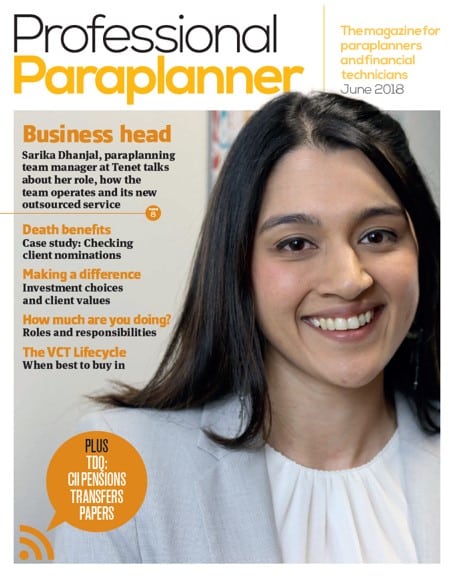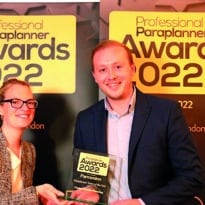Sarika Dhanjal, Paraplanning Team Manager at Tenet, tells Rob Kingsbury about her role, how the team operates and its new outsourced service
As manager of the paraplanning team at Tenet, Sarika Dhanjal is not herself a paraplanner but rather, her role is one of business management, team development and the bigger picture. It’s a type of role she sees becoming more widespread over time, as paraplanning teams grow larger and need to be run as business operations, especially amongst outsourced paraplanning businesses.
“If you’re running a profitable outsourced paraplanning business then I think you do need someone who has stepped away from the day-to-day detail and looks more to management, whose role is to run the business, run the team and not get involved in the day-to-day paraplanning, because it allows for focus in the different areas,” Sarika says.
It’s a role that is needed for the Tenet paraplanning team, which is run as a defined business within the company, operating on a profit and loss basis and reporting to the board.
Tenet has been running an in-house paraplanning team for five years, serving its network members as well as its financial advice arm, Aspire Financial Management. Currently, the team consist of Sarika as manager; nine paraplanners (three office-based and five home workers)under paraplanner and supervisor, Jonathan Gill; three administrators, including administration supervisor, Ben Hewson; and a three-person quality assessment team.
All the paraplanners are at least diploma qualified, with six having advanced level qualifications.
The team operates a pooled system, whereby the work comes in to an inbox which is downloaded by the admin team. Each paraplanner has a dashboard via which Sarika can see how many cases they are working on and what types of cases. Different members of the team have different areas of specialism or knowledge and the cases are allocated accordingly. Requests from advisers using the service for particular paraplanners are met where possible. “We accommodate where we can,” says Sarika.
Having three quality assessors providing audits on the paraplanners work, who are checking for, amongst other things, accuracy, consistency and adherence to Tenet policy, is an important part of the operation, Sarika explains. Two of the three assess usual cases and one assesses pension transfer cases.
“It’s been really important for us within the team to have our own paraplanning assessors, who focus on paraplanning cases, as opposed to others in the business who deal with the advisers, because we work in a different way,” Sarika says.
“It means that in every case the paraplanner will receive one-to-one feedback, which apart from ensuring quality across all the cases we work on is also great for development.
“Since introducing the assessment team we’ve seen the quality and consistency of the work of both individual paraplanners and the team as a whole improve and that is seen in the feedback that we get from advisers too. That extra process does add time on to the case but it gives the advisers peace of mind that the work they get back is consistently to a high standard.”
Paraplanning team manager role
Sarika’s background in financial services, following a degree from Leicester University in Computer Science, completed in 2005, is several years working with Santander and HSBC. She started as a personal banking adviser and then became a financial adviser (working through her CeFAand CeMAPexams and obtaining Level 4 Diploma). She also became a mother and having been made redundant by Santander in 2012, in the wake of RDR, by chance a mother at her daughter’s dance class told her of a job going at Tenet.
She joined the company as a Competence Consultant. This involved one-to-ones with advisers, reviewing their file checks, analysing the kinds of cases they were doing and looking out for things like provider bias, for example. It included statistical analysis and supporting advisers, in particular those new to the role, with training to achieve competent adviser status.
She was in that role for approaching three years and then sought promotion into a managerial role in the paraplanning department. “Then, when my immediate manager left in March, I was given the opportunity to manage the whole team,” she says.
“So, it wasn’t a direct journey into paraplanning but I like to think that with each job I gained more knowledge and experience, all of which has helped me manage the team whilst supporting them as well.”
Sarika describes the paraplanning team as “like a mini business within Tenet”, which is expected to bring in income, and so her role requires that she measures not only the team’s workload and capacity, but identifies what marketing is needed to ensure a steady flow of cases coming in, she explains.
She organises training for the team and supports them via one-to-one meetings on a monthly basis, where they will discuss any issues and development needs.
With other departmental heads, technical and compliance etc, she is also involved in policy decisions, generally arising from regulatory or legislative changes.
“We will also look at whether the policy fits into adviser life. We will get feedback from advisers and assess what’s working and what’s not and whether there needs to be a change of policy.”
This works on a practical paraplanning level as well, she says. A recent example of this, she says, was in respect of paraplanning support provided to advisers who were looking to give advice to clients in the British Steel Defined Benefit Scheme. “We took the stress and pressure off advisers. With our support, 107 clients received compliant, timely advice to either transfer out or move to BSPS2/PPF within a period of four months. An FCA review of a sample of British Steel cases written by us found the advice was appropriate and exceptionally well documented.”
As part of that process it became apparent that there was a need to run TVAS not just on the old scheme, which was closing down, but also on the new scheme to which the pension holder was being transferred, she says. “We went back to the policy team on this and it became Tenet policy that with British Steel cases we had to run the two TVAS reports.”
That practical application and challenge where it is in the best interest of the client, “is something we do a lot of within the team”, Sarika says. “My role means I’m the link between the compliance side and the commercial side.”
Growing the business
Sarika’s role also includes growing opportunities for the team. “I want to drive the paraplanning business forward,” she says. “That’s about how we develop the process, how we streamline it to make it more affordable for advisers, what support we can offer advisers with regard to the advice process – all with a view to delivering a better outcome for the end client.”
One of the projects she is working on at the moment is to bring the paraplanning unit of Tenet’s advisory arm, Aspire Financial Management, into line with the service offered via the Tenet paraplanning team. “We’re also trialling an admin service with the Aspire advisers, with a view to offering it out to Tenet network members and potentially, as an outsourced service to non-members as well.
“Outsourcing their admin can simplify advisers’ processes, improve business efficiencies and costs, we help them to grow their business by seeing more clients,” she points out.
“We’re also looking at developing a ‘robo’ offering, where we’ll use artificial intelligence to streamline the paraplanning operation and so bring the costs down. We’re looking at that for less complex cases and it will do things like pre-population and co-ordinating of the research, which will cut down the amount of time a member of the team will need to be working on the case. We hope that will make it cost effective for more advisers to use the paraplanning service.”
Alongside seeking new business opportunities, Sarika is looking to expand the size of the team in order to offer more admin and paraplanning services. “The advantage we have as Tenet is our background as a network, with our focus on standards, quality and consistency, so advisers can have confidence and comfort when using our service.”
So, is it a role she enjoys? “Absolutely. As a manager I’ve got my fingers in a lot of pies but while the role is more about daily workflow, team development, policy and the bigger picture, I am still very much involved in the overall process and the value that the paraplanning team brings to Tenet and the advisers that use the service. The great thing about paraplanningis that it is constantly evolving. There are new things happening all the time and no case is ever the same, all of which can challenge and test you. I am fortunate to have a fantastic team who support me and really go that extra mile to ensure we do well. I think that is why I enjoy the job so much.”
What’s a typical day for Sarika?
My typical day starts the night before. I like to prepare for the next day in advance, so once I’ve put my children to bed I’ll open up my laptop and see what I’ve got planned for the next day.
I start work at 9.30am and the first thing I do is open up the dashboard to see what the paraplanners’ activities are for the day, what the quality controllers are checking that day, and also where the priority cases are, so I can check in with the paraplanner to see where they are in the process. I do the same with the quality controllers, particularly where I know an adviser may need a case back sooner. It’s about managing the order of the workflow and assessing and following up on priority areas.
Then, I’ll check my emails and liaise with Ben, the admin team supervisor, to see if there are any issues I need to deal with.
After that I’ll look at what I need to do for the day. At the beginning of the month I do the finance figures, so I’ll look at profit and loss and what our breakeven was for the previous month and prepare the figures for the board.
We also have monthly quality meetings, where we have a Q&A session and we audit some of the files, so we know everyone’s working in the same way to the same standards. Also, I’ll have a separate meeting with the paraplanning supervisor, Jonathan, and the quality assessors to review cases and see if there are any areas where we need to take action or inform the team.
If an adviser is paying for a report they expect a gold standard report every time so it’s important for us that we are constantly checking to ensure our standard remains high and for consistency.
My role is also about supporting the team, so we have weekly update meetings and then I’ll have quarterly one-to-ones where I’ll meet for an hour with individual members of the team, which is more in depth and where we talk about development.
Having home workers all over the country and in Ireland, we use our intranet system to bring our home workers into the team, celebrating birthdays and things like that. We’ll have full team meetings every six months where we all get together for a day to discuss issues, rules changes and cases, which helps bring us together as a team.
Technology
Technology is used within the team for efficiency, with a focus on keeping things simple and effective, Sarika says. Software used includes:
- Cashcalc for cashflow modelling – predominantly for DB transfer work;
- O&M and Select-a-Pension for pension advice;
- FE Analytics for fund research and risk mapping;
- Tenet fund and product panel system. “All tenet network members use the Tenet panel as a basis point for their advice. This is put together by our technical department, with all the due diligence and checks having been made by that team. Advisers can go off panel if they have good reason as to why it better meets the client’s needs.”
- Word for Suitability reports. “So advisers can use the mark up tools for any comments or amendments they would like made.”
- Workflow system: Tenet uses Seneca by Egton – which was built for the legal profession. “With GDPR in mind, this allows us to hold all our information in one place, and from a paraplanning perspective, enables case monitoring, and daily output into an excel spreadsheet which calculates the day count and helps me manage workflow and timescales.”





























